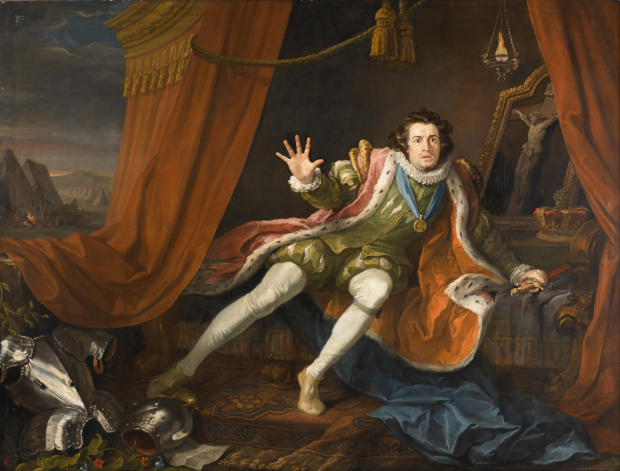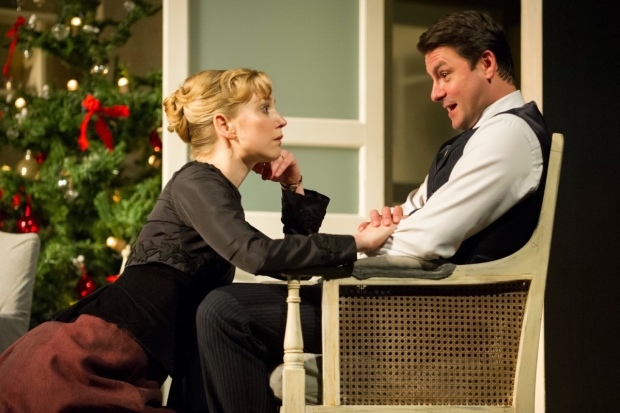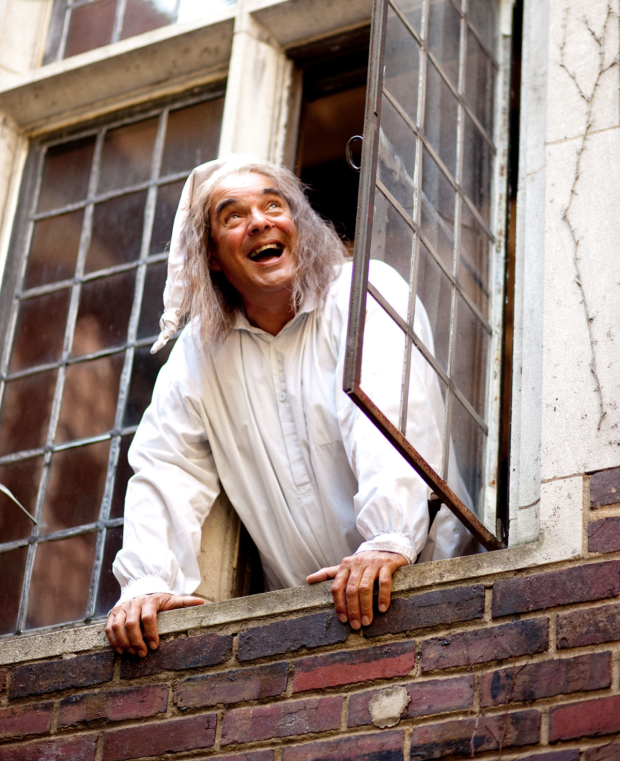A Carol Faintly Heard (Part II)
How Charles Dickens and Christmas became synonymous.
This is part II of Michael Feingold's latest "Thinking About Theater" column. Click here to read part I.

While I was pondering Christmas entertainments and the deep persistence of Dickens' A Christmas Carol among our cultural myths, I remembered an "inappropriate" play that had always struck me as having a Christmas connection: Shakespeare's King Richard III.
The connection is a mere three lines long. It occurs in Act 2, Scene 1. Richard, not yet king, is at the court of his elder brother, Edward IV. As it opens, Edward is in the process of effecting a reconciliation among the courtiers' various warring factions. Arriving late at this picture of general (and largely pretended) friendliness, Richard cheerfully offers his own conciliatory declaration, to anyone present who claims to have a quarrel with him, in these somewhat curious words: "I do not know that Englishman alive / With whom my soul is any jot at odds / More than the infant that is born tonight."
No other evidence indicates that Shakespeare meant this scene to take place on Christmas Eve. A child born any day is born innocent; courtiers might reconcile in any season. Yet ever since I read those lines for the first time, over half a century ago, I've nurtured the totally unprovable belief that they are spoken at Christmas. Like those old Druids praying for the sun to reappear over the treetops, I want the light to come. I want that hope, just as poor ailing, beleaguered Edward wants peace at his court.
Only one phrase of Richard's links the scene to Christmas. Even in Shakespeare's time, the words "the infant that is born tonight" must have evoked a thousand carols and sermons. Yet his assertion of amity toward everyone is, as we know, a flat lie. He hates them all, and in the ensuing acts will destroy most of them. He has come to the court with a particularly nasty secret up his sleeve, having just had his brother George, Duke of Clarence, murdered in a way that cunningly puts the blame on Edward.
Adding Christmas reveals that the lines contain a syntactical trick. Read one way, Richard is saying that his soul is no more at odds with the other courtiers' than a newborn infant's. But he could also be saying that his soul is no more at odds with theirs than it is with the infant’s. And if the infant in question is Jesus, bringer of love and redemption, Richard’s soul is maximally at odds with him. A bringer only of misery and death, he is the antithesis of hope.

(© Richard Hubert Smith)
No theater that I know of has ever offered Richard III as Christmas entertainment, yet Richard's story and Scrooge's are in many ways identical. Both contain ghosts, both display heroes of unmitigated heartlessness who both experience the same nightmare fear: that of dying alone, unlamented, and unloved. Scrooge, seeing his future laundress steal even the burial shirt from his corpse, can reform because his self-pity teaches him to pity others. Richard, pitiless even to himself, must end tragically.
The dark future that Scrooge escapes, and that Richard doesn't, looms ahead in many plays set at Christmastime, ranging from the familiar — Ibsen's A Doll's House, Miller's A View From the Bridge — to the rarely revived. Both Frank D. Gilroy's Who'll Save the Plowboy? and Tennessee Williams' Period of Adjustment rank as high points on the latter list. (Another is Craig Lucas dark screwball comedy, Reckless, which opens with a wry holiday joke: The heroine in bed on Christmas Eve, watches a TV news story about a refugee woman giving birth, so we hear the newscaster say, "Mother and child are both in stable condition.")
These days, hope and light seem uncommon in our lives, and not just in late December, when literal darkness prevails. Stagings of A Christmas Carol may have given way to the newer, shinier Christmas tie-ins, the ones I resist attending, because the simple, personal solution Dickens proposed no longer seems sufficient. That life would magically get better if the boss only cared a little more about the needs of his workers and the woes of his debtors doesn't wholly apply when the bosses are far away, in lofty or gated isolation, cushioned from others' cries by multiple levels of intermediaries. To them the sufferings of the poor, the sick, the elderly, and the unemployed are only statistics.
Our species' very existence appears unhinged. Between climate change and terrorism, the news of the day keeps implying that gloom is in order, that a dark global cataclysm of some kind looms ahead. So it must have seemed in the 1930s, when one of the era's greatest writers, Bertolt Brecht, penned a famous poem beginning with the line, "Indeed I live in dark times." The last phrase is a bleak pun: finsteren Zeiten can mean either "dark times" in general, or it can refer specifically to the dismal epoch of European history that we call the Dark Ages — an epoch of ignorance, bigotry, and oppression scarily similar to the one we often seem to be moving toward.
Brecht's line resonates deeply with me because, when I read the news each morning, I vacillate between the awareness that I live in dark times and the increasing terror that we are all drifting toward a new Dark Age. Far too many of the world's leaders, and their increasingly vociferous followers, appear eager to emulate Richard III, not the infant whose birth Christmas is meant to celebrate. Hope can be hard to find under such circumstances.

(© Scott Suchman)
Still, we celebrate. The darker the times, the more we need the celebratory joy — not the superficial joy of partying and overeating and piles of gift-wrapped gadgetry acquired on CyberMonday, but the inner joy of believing that good still lives in this world, that the light will return, bringing hope for a goodness yet to come. That hope can be religious or secular: Hope is nondiscriminatory, and can reveal itself to us anywhere, at even the darkest time. It can even occur in the theater, which is why so many of us keep going.
Dickens knew that. Otherwise, his works would not have offered the theater such a multitude of opportunities: No novelist has ever been more frequently adapted, or in more varied ways. And he knew, through dark personal experience, both the agonies of the poor and the hollowness of material wealth. As his success increased, more and more of his monied characters came to grief, brought down by their crimes against the poor. Scrooge, alone among his tycoons, sees the light and changes his ways. No — to put it more accurately, he changes his ways after seeing the darkness that waits in his future. I can think of prominent people who might find that moral worth pondering.
Michael Feingold's next two-part "Thinking About Theater" column will appear on consecutive Fridays January 22 and 29, 2016.
Michael Feingold has twice won the George Jean Nathan Award for Dramatic Criticism, most recently in 2015 for his "Thinking About Theater" columns on TheaterMania, and has twice been a finalist for the Pulitzer Prize in Criticism. He serves as chairman of the Obie Awards and has also worked as a playwright, translator, and dramaturg.









